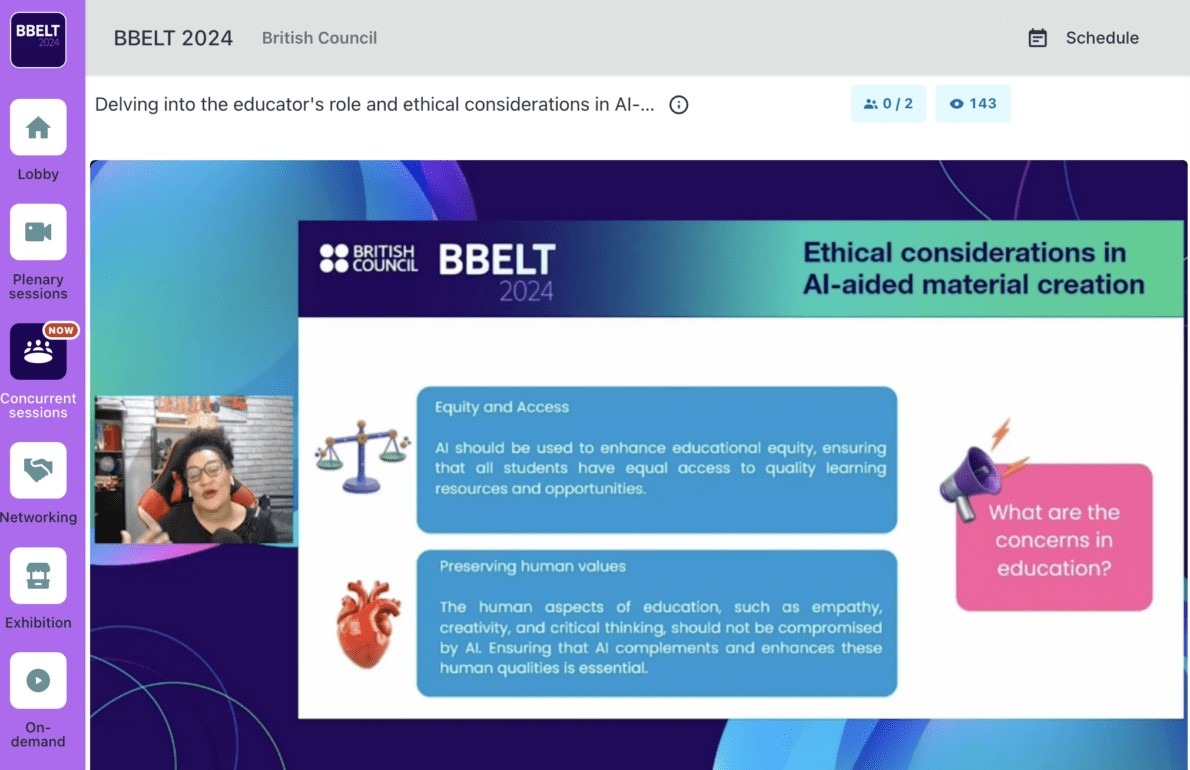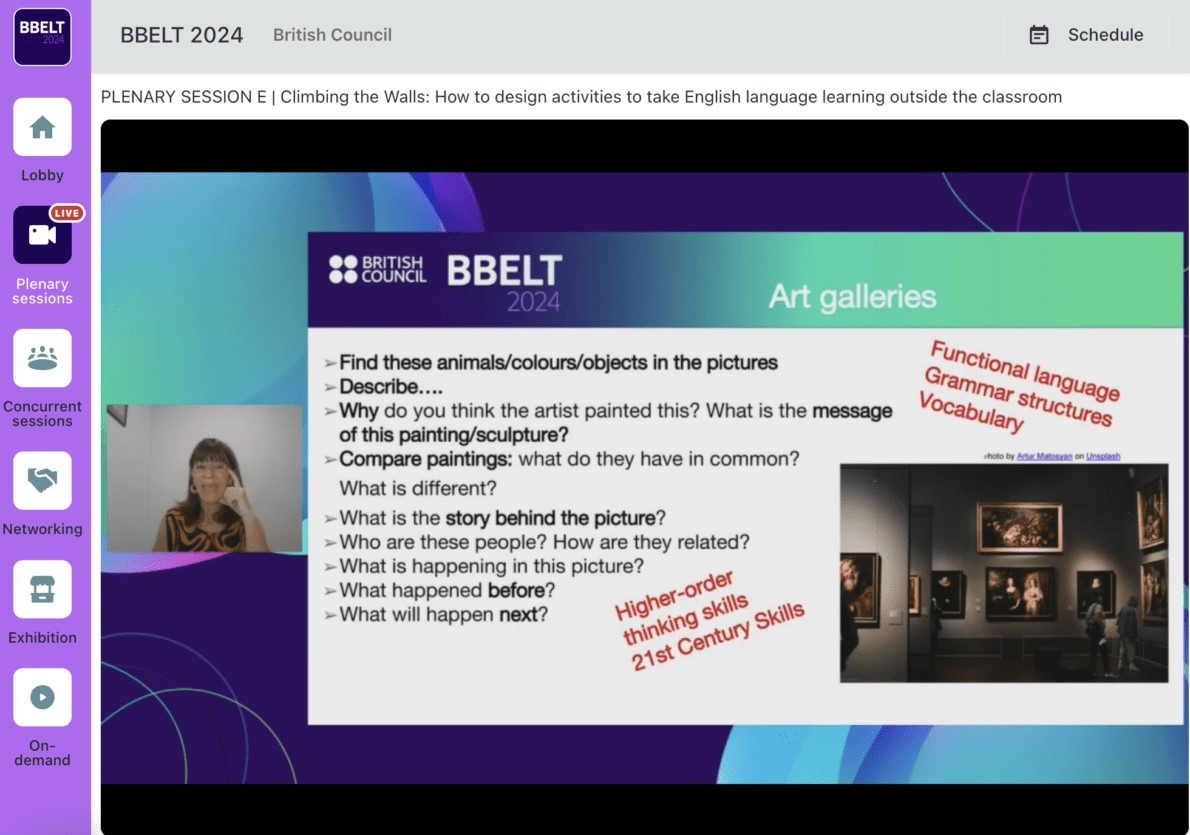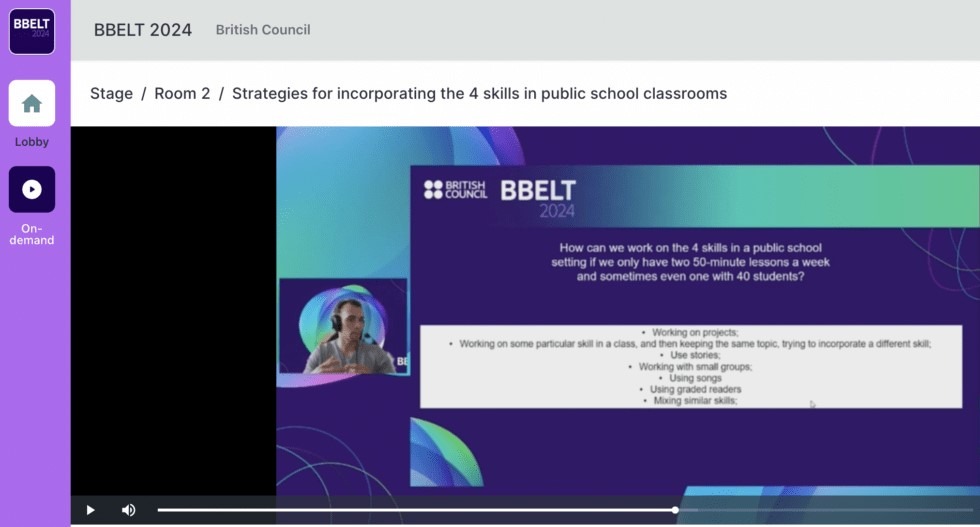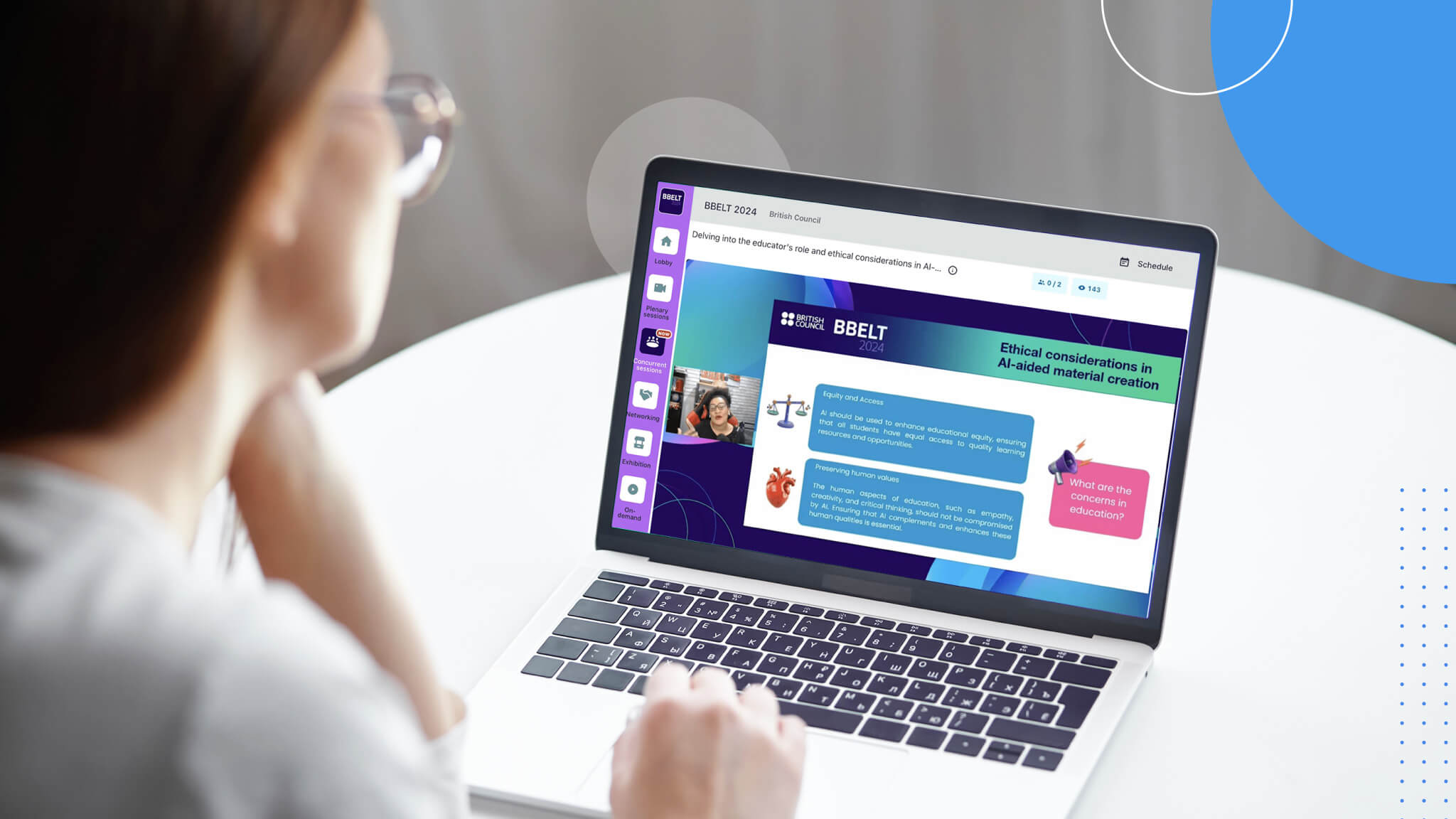Technology was the topic de jour at this year’s 21st Best and Brightest in English Language Learning (BBELT) Conference, held March 1-2, with many presenters discussing ways to leverage AI in ELT, ethical considerations of AI, practical AI tools to teach English, AI for language assessment, virtual classroom management, generative AI and SGE, and much more.
Organized by the British Council, this year’s online event for ELT educators featured a series of talks, workshops, forums, and keynote sessions on various topics such as teaching strategies, language assessment, and the use of technology in the ELT classroom. In addition to attending the live sessions, BBELT attendees also had the chance to connect through networking video calls as well as visit and chat with exhibitors in their virtual booths.
“I particularly enjoyed this edition of the conference because it has been by far the largest audience, and the one where the team has felt more confident with the virtual delivery and the hosting platform,” said Liliana Sanchez, the Head of English Programmes at British Council Mexico. Sanchez is a regular speaker at BBELT and has participated in over 15 BBELT conferences. “The response from the audience also continues to be better every year.”
English Programmes Lead of British Council Americás Graham Stanley wrapped up the BBELT Conference with a final question for participants to reflect on: “How can I best serve the learning outcomes with technology?” With six plenary sessions and over 60 academic presentations, forums, talks, and workshops, attendees were left with a lot to reflect on. Let’s look at some of the conference highlights.
Learn about ways to hyper-personalize your Business English teaching with AI.

Tackling AI in the ELT Classroom
A prominent theme at this year’s BBELT Conference was the use of artificial intelligence (AI) in English language teaching, with topics including ethical considerations, creating assessments, inclusive learning, and more.
“The use of some AI systems such as ChatGPT in the ELT classroom has generated great interest and questions about their ethical use. I believe this is where most of the interest comes from. Undoubtedly, teachers see the value of using AI systems to support learning but they are also aware of the risks embedded in its use, for example, in developing writing skills and plagiarism,” Sanchez pointed out.
The organizing team also hosted forums and in-depth discussions for teachers to share their opinions on the use of AI. “Many comments in the session chats questioned the future of the role of teachers and invariably the comments pointed out foreseeable risks,” Sanchez said. “Some speakers proposed steps toward adopting the use of AI for teaching and clarified that this was like any other resources in the classroom and that teachers would continue to play a central role in the learning process.”
One of the sessions that looked into the integration of AI was led by Tamires Gama de Oliveira, who presented on the educator’s roles and ethical considerations in AI-aided material creation. An online English school owner in Brazil and technology enthusiast, Gama de Oliveira first discussed the key aspects of creating AI-generated teaching materials. She delved into the adaptive learning capabilities of AI and the creation of automated assessments. She then shared some standards teachers can consider when using these AI features.
She suggested teachers ask themselves, “How can I use [AI tools] to personalize my student’s learning experience?” She also highlighted the ethical implications of using AI for creating class materials, which may include generating biased content, data privacy, and challenges associated with providing learners access to AI tools.
“As teachers, we have the power to use AI to enhance learners’ experiences, but we are the ones choosing what’s best,” Gama de Oliveira pointed out.
Meanwhile, teacher trainers Heriberto Díaz and Lucian Alexandrin gave a workshop on practical AI tools to assist teachers. After outlining the history, features, and functions of generative AI (the artificial intelligence behind apps like ChatGPT and Synthesia), Díaz and Alexandrin gave tips on how teachers can be better “prompt engineers” by feeding the AI tool with direct and specific prompts to come up with the most effective generated content. To demonstrate this, they showed examples of the prompts they used to generate emails, warm-up activities, and lesson outlines through ChatGPT. They also presented ideas teachers can choose from to create their “gen-AI teacher’s toolkit,” which are techniques or tools for using AI more efficiently in the classroom. As a tip, Díaz also pointed out, “Focus on learning, and evaluate the learning process.”
Interested in learning more about generating effective lesson plans? Download the infographic, 3 Steps to Create a Lesson Plan Using AI.

Solutions for low-tech or no-tech classrooms
While many presenters discussed ways to leverage technology, some also focused on strategies, materials, and activities for classrooms that may not have much – or any – access to technology. These sessions primarily focused on motivating students and achieving learning outcomes in creative ways. For example, one session focused on the communication skills teachers need in synchronous low-tech environments. Additionally, ELT Consultant Claudia Rey’s plenary session on designing activities to take English language learning outside the classroom included ways to adapt tasks in low-tech or no-tech classrooms.
Ray shared how teachers can design activities to take English language learning outside the typical classroom setting by establishing three scenarios: planning a school trip, virtual tours, and developing activities in low-tech or no-tech environments. Using a museum visit as an example, she listed tasks that teachers could incorporate into the activity, which included creating word banks, doing scavenger hunts, and comparing artifacts. To adapt these tasks in low-tech or no-tech classrooms, she suggested the use of materials teachers can easily find, like posters, photos, and brochures.
Looking for creative activities to get your students engaged? Learn about 16 fun ESL games and activities for kids and teens.
Incorporating dynamic tasks to engage and inspire
Some sessions focused on interactive task- or project-based learning to encourage higher-order thinking, better engage students, and assess learning. For example, some sessions addressed topics such as implementing project-based learning as a formative assessment tool, integrating STEAM projects in ELT for young learners, integrating skills tasks in the ELT classroom, creating projects that involve an entire school, and more.
Bridge alum and EFL teacher Matheus Nazário presented strategies for incorporating speaking, listening, reading, and writing skills in public school classrooms. Having started as an intern in a public school, he shared the typical problems public school teachers face, ranging from lack of resources to being pressured to teach for standardized test results. Despite these challenges, however, he asserted that it’s still possible to motivate public school students to learn more, both inside and outside the classroom, through dynamic tasks that reinforce the four language skills of reading, writing, speaking, and listening. For example, teachers can incorporate group projects, storytelling, and song activities, all of which encourage students to practice their productive and receptive English skills.
“Variety is the spice of life,” Nazário said. “The more monotonous the classes are, the less engaged students will be.”
Learn about eight practical ways to use AI to teach ESL reading.

Bridge’s contributions to BBELT’s professional development mission
To aid the BBELT mission of supporting the continuous professional development of English teachers around the world, Bridge participated in this year’s conference by donating four certification courses that were raffled at the end of the conference to four lucky winners. Courses raffled included:
Bridge’s Maggie de Oliveira and Anna Hearrell met with conference attendees, sharing information about Bridge’s online TEFL/TESOL certification courses and other professional development resources, and providing discounts to attendees who visited.
Ready for more professional development? Explore Bridge’s TEFL/TESOL Events Calendar to find upcoming events online and around the globe.
[tribe_events]
Continuous growth as ELT professionals
Overall, the 2024 BBELT Conference was an avenue for ELT professionals to further develop in their professions by learning new pedagogical techniques, considering new perspectives, and engaging in discussions on the latest ELT industry trends. This year’s in-depth discussions on AI uses and considerations showed the endless capacity of the ELT industry to evolve and adapt, while always maintaining the important humanistic approach critical to effective teaching.
A testament to the educational potential of technology, the record-high engagement of this year’s online, interactive conference inspired not only attendees but also conference organizers. Even higher goals will be set for next year’s conference, Sanchez said. “The quality of the talks and moderation of speakers, the engagement of the audience, the network achieved online, and the spirit of the BBELT community is what makes this conference unique.”








